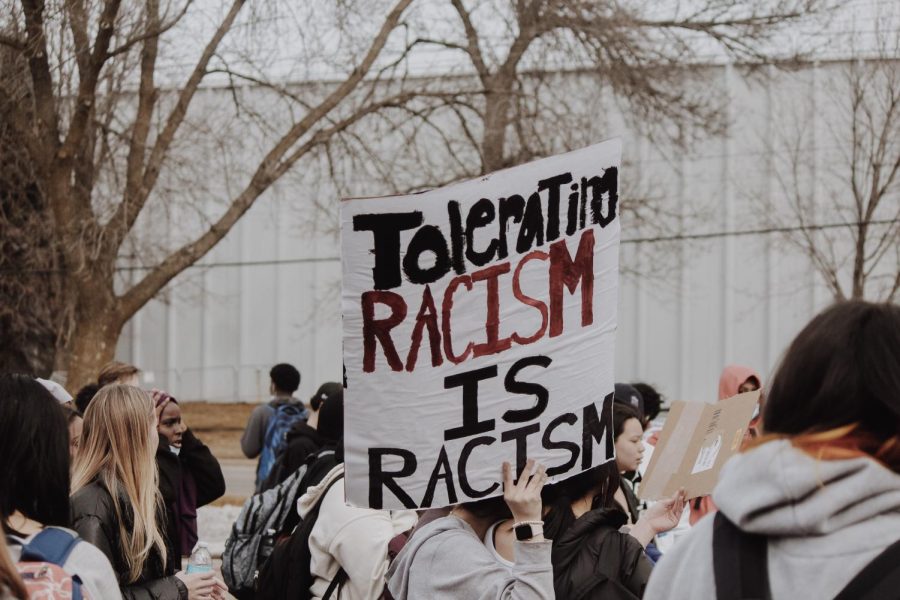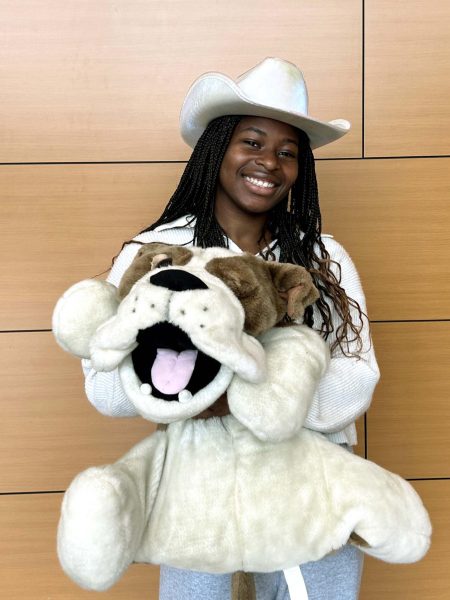Backlash against racist video launches EHS student-led walkout
Amidst the chatter, students retrieved signs—a few read “Tolerating Racism is Racism” and “Racism is the Biggest Pandemic”—and prepared themselves for the trek to Lewis Park.
April 20, 2022
On Thursday, March 17, approximately 200 students and supportive parents marched from Edina High School to Lewis Park, protesting the racial and religious injustices brought to light in a racist video that surfaced a week prior. Peers of different backgrounds came together to plan the event, prepare speeches, and demand change.
Soon after the circulation of the video on social media, Principal Andrew Beaton sent an email to families responding to the video. Beaton referred to the video as “culturally insensitive,” which incited peers at a student leadership meeting to correct that it was plainly racist. Members of the Edina Asian Parents Group (EAPG) displeased with the response created a petition, wanting the school to initiate “institutional change” and prevent more incidents from occurring.
“I think it’s important that all people who feel misrepresented or underrepresented, or like they are being shut out of our system, or being discriminated against by the system—it’s really important that they speak out and are part of the conversation,” junior Sally Rendleman said.
Working up to the walk-out: the start of a “newer Edina”
For years, junior Richanta Pollard has been tired of being exposed to casual racism.
“It’s just not noticeable, it’s just so common that it has to be so enlarged to really notice it,” Pollard said. “It shouldn’t have to be people not realizing that it’s not there. You should know it’s there and know when it happens.”
Five days prior to the walkout, a student submission was posted onto Edina Truth’s Instagram account: “[I] think the only way admin will pay attention to our anger about this situation is if we do a walkout,” the post said.
After seeing the submission, leaders of Edina Truth, Pollard, junior Ayo Ayelomi, sophomore Sarah Hu, and others, worked quickly to put the event together. As early as March 13, information was posted on Edina Truth regarding the walkout, namely relaying the partnership with activists Lavish Mack and Courtney Paris. Both had been involved with other student-led walkouts at high schools in Prior Lake and Minnetonka over similar incidents.
The group decided the walkout’s date and location. Then, the organizers met in Black Student Union advisor Sarah Hinson’s room on Tuesday morning and began creating posters.
“We brought in posters, paint, and markers, and we just started off-the-dome writing what we wanted to convey to the media and the school administration,” Ayelomi said.
Edina Truth continued posting additional information regarding the walkout, asking for speakers, and demanding EHS to provide “substantial race and religious education…to prevent racist action.”
“Not condoning nor opposing”: pushback from school administration
On the evening of March 15, Edina Public Schools sent out an email to families and staff, alerting them of a planned student-led walkout to be held on Thursday. “EPS is not condoning nor are we opposing the March 17 walkout,” the email stated. It described school policy which declares that students assigned to a teacher’s flex are to report to the class or be marked absent, and requested parents to discuss their children’s involvement with the activity.
As the walkout was not a school-sponsored activity, organizers were not permitted to hang up posters. Instead, promotion had to be done through social media and by handing out flyers. Likewise, organizers were told that they would have supervision during the walkout, which was later contradicted in a second email. “They constantly were putting things out there to almost cut us off, so our numbers would start slowly cutting down,” Pollard said.
This second email additionally commented upon the collaboration with Mack and Paris and detailed what the pair had been involved in prior. “Dozens of additional adult protesters have attempted to enter school buildings, and have led to significant disruptions to school district activities,” the email stated.
“I think the initial public discourse [from the school] was very disappointing,” Kelly Condit-Shrestha said. She participated in the walk-out and is the mother of a second-grader enrolled in Edina Public Schools. “I think the problem with this is that [school officials] were not prepared for this to happen and the response was not appropriate.”
“I demand change”: A speaker list gaining names
Despite roadblocks in organizing, students avidly discussed the walkout. Some angered about EHS’s intolerant atmosphere began preparing speeches, including Hu, Rendleman, and junior Claire Chen.
Chen was first exposed to the news of the walkout through the organizers and found more details on social media. Having the chance to speak in front of other students was monumental for Chen as she wanted to make non-POC students aware of the persistent racism their peers face on a daily basis. “[I spoke] to help other Asian Americans [by saying], ‘You’re not alone, I know how you’re feeling and we’re going to be able to work through this together,’” Chen said.
Rendleman opted to be on the speaker list as a representative of Edina’s Jewish student community.
“I hope to bring real stories to the forefront and [talk] about my experience with antisemitism from not only students but from teachers, and from our school system as well,” Rendleman said.
Hu decided to become more involved with the event after seeing details about it on Edina Truth’s account, even discussing it with Chen before committing.
“I believe that Asian Americans need to speak up and especially because the video was a direct attack against the AAPI community and Jewish people,” Hu said. “I decided to be the person to do it.”
With megaphones and signs in hand: initiating the march to Lewis Park
On Thursday, March 17 at 2:18 p.m., the bell signaled the end of sixth period. In the eight minutes before the start of flex, students began to congregate at Door 3 by Edina Performing Arts Center. Amidst the chatter, students retrieved signs—a few read “Tolerating Racism is Racism” and “Racism is the Biggest Pandemic”—and prepared themselves for the trek to Lewis Park.
For 30 minutes, protestors marched, joined by several Asian parents. Hoping to stand in solidarity with the youth, mothers Condit-Shrestha and Zoey Zou arrived along with others in EAPG. The parents helped to create a petition addressing the lack of discipline the seniors in the racist video faced.
The petition established three concrete actions geared towards the video’s aftermath for the school to take. They requested EPS to create a resolution that clearly condemns racism and xenophobia, holds a space to heal and discuss solutions for structural change, and an established process to address future racist incidents. The group planned on collecting signatures from the students, staff, and Edina residents or organizations to later present to the school board.
From the front of the line, Ayelomi chanted into a megaphone: “No justice, no peace,” and “Hey hey, ho ho, these racist people gotta go.” Along with a van driving along the line playing songs boasting pride in Blackness—namely “Alright” by Kendrick Lamar—protestors repeated these chants and emphasized their signs.
“I feel like we didn’t get justice with the way the consequences were—it wasn’t enough,” Ayelomi said. “Living a normal life [and] going to classes after hurting the Asian and Jewish community. It’s just not okay.”
Once they arrived at the park and formed a crowd around the speakers’ area, protestors were greeted with pizza, snacks, water, and blankets once the temperature fell. Funds to purchase the commodities were donated by parents. Behind the crowd, the League of Women Voters and parents volunteering to shuttle kids back to school to catch their buses stood in support.
Until 4:30 p.m., around 20 speakers shared their experiences of discrimination in Edina and their disappointment regarding the residents’ integrity and EHS’ response to what they’ve endured. Chen, Hu, and Rendleman were all anxious.
“Beforehand, I was really nervous; I don’t know if excited is the right word, but I felt like I was ready to [speak],” Rendleman said. “I felt like it was definitely something that I needed to do.”
Chen revealed her experiences of racism at the school by bringing up a story about being harassed by boys throwing milk cartons and apples at her and her friends at lunch. Similar to the racist video, she felt that the light punishments were unjust compared to their actions. She also spoke about the generational racism that her family has faced ever since her grandparents moved to the US:
“My grandparents would be so heartbroken to know that two generations and 52 years after stepping their first foot in America for the first time, their grandchildren are going through the exact same thing,” Chen said.
“Afterwards, I was still really emotional, and [speaking] felt so vulnerable, but in a way where I was surrounded by people who actually understood me,” Chen said. “It just felt really empowering when I was finished.”
Hu also shared her experiences of racism in school. She called upon white students to listen to experiences their peers underwent.
“Step out of your comfort zone and maybe even consider that the world isn’t as perfect as you built it to be. Use your privilege and speak up,” Hu said.
“I hope I inspired at least one person to be more aware and more conscious of their actions or just how they behave around people and to just speak up when they see people being racist,” Hu said. “I hope I inspired people of color to not be afraid and to defend themselves when a situation like this happens.”
Rendleman exposed how teachers have done and said antisemetic actions and comments. For years, she asked teachers to receive and complete homework in advance as she could not work on the Jewish high holy days. However, teachers denied her.
“I’ve been told time and time again: ‘Sally, you go to an American public school; America is a predominantly Christian country, and you’re just gonna have to deal with it,’” Rendleman said.
“I know a lot of times I feel, even within the minority community, I get shut down because my problems aren’t as big as other problems. I think it’s really important to try to get rid of that stigma around it and just appreciate the fact that all of us have our problems being part of minorities.”
Every speech was met with applause. The walkout allowed students whose voices had been ignored for years to finally speak up and speak out. That evening, parents appreciated the baby steps that EPS administration had taken, namely a listening session that was initiated and held for parents.
“I’m just so proud of everybody, every person of color and for the white kids that came to this rally, too, because for these white kids to come and just stand by us and say, ‘I support you and even if I don’t understand you, or [even if] we’ll never understand the hardships you face as people of color,’ hasn’t been talked about enough,” Chen said.
“Still pushing”: the aftermath
Feelings of optimism began to be overshadowed by continued racist interactions on campus. “I’ve already seen people sit down [and say] racial slurs, like it was two days ago,” Pollard said.
Nonetheless, Condit-Shrestha and Pollard are hopeful of faculty and students pursuing change.
“I think that the work that they’re trying to do now and learning about the work that they’re trying to do behind the scenes initially to try to be preventative—and just structural change—is very promising,” Condit-Shrestha said.
“Time is precious, and we want to make sure we can [make change] while we’re still here,” Pollard said. “We’re the image of the new Edina—the Edina to create change, justice, [and] proof that there’s a possibility of better out there.”



